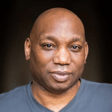
Episode 496: Jeff Pearlman Finds the Little Guys
“So much misery. It is so much misery. It is so hard. It's not natural, locking yourself in your room for three years to focus on one person is not mentally healthy. Leigh Montville, great, great writer, said to me years ago, he's like, ‘It's an unnatural thing. You spend two years in a hole to come out for two weeks, you know?’” — Jeff Pearlman, author of Only God Can Judge Me.
Today we have Jeff Pearlman returning to the show to talk about his 11th book, his latest book, Only God Can Judge Me: The Many Lives of Tupac Shakur (Mariner Books). Jeff has made a career out of being a sports writer, so when I heard he had turned his biographical eye toward a hiphop icon from the 1990s, I was especially intrigued by how he would approach it. It’s the kind of book he could pursue after having proved himself ten times before, with a few of his books becoming coveted NYT bestsellers. He interviewed close to 700 people for the book … that’s how you do this. THAT is how it’s done.
The first time he was on, I think I annoyed him a bit with my questions on “craft.” He kind of bristled at the idea that it was a “craft,” which maybe he thought was too cute a word to put on it. To him, it’s fucking work. You make all the calls. Then you make more. You go to the locations. You knock on doors. You report, report, report. It has more to do with tenacity and rigor than art … so I made sure I steered clear of things that felt too crafty this time around.
Jeff is all over the place. By that I mean he’s got a YouTube presence with The Press Box Chronicles, a TikTok presence with more than 300,000 followers. He has a podcast, Two Writers Slinging Yang (still waiting for my invite), a political Substack called The Truth OC, and his writing/journalism Substack The Yang Yang. He’s a writer in his 50s and he’s tremendously nimble. He understands, even with his platform and profile, that nobody is going to champion your book like you can. Honestly, we can all take a page out of his book and how he has embraced the ever-changing playbook for book promotion.
In this conversation Jeff and I talk about:
- Book promotion
- Finding the little guys
- How he handled another Tupac biography publishing during his research for this book
- The misery of it all
- Conversations he had with Jonathan Eig, the PP winning author of King: A Life
- Jeff’s favorite “version” of Tupac
- And hitting the “fuck-it” stage.
All great stuff, as you might come to expect from speaking to Jeff Pearlman. His audio was a bit muddy. It’s not as great as I would have liked but I think the message carries the day.
Newsletter: Rage Against the Algorithm
Show notes: brendanomeara.com



















